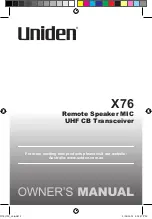
If you wear a portable radio or walkie-talkie on your body, ensure that
the antenna is at least 2.5 cm from your body when transmitting.
Electromagnetic Interference/Compatibility:
Nearly every electronic device is susceptible to electromagnetic
interference (EMI) if inadequately shielded, designed or otherwise
configured for electromagnetic compatibility.
To avoid electromagnetic interference and/or compatibility conflicts,
turn off your walkie-talkie in any facility where posted notices instruct
you to do so. Hospitals or health care facilities may be using
equipment that is sensitive to external RF energy.
When instructed to do so, turn off your walkie-talkie when on board
an aircraft. Any use of a radio or walkie-talkie must be in accordance
with airline regulations or crew instructions.
Operational Caution
!
Damaged Antennas:
Do not use any radio or walkie-talkie that has a damaged antenna. If a
damaged antenna comes in contact with the skin, a minor burn may
result.
Batteries:
All batteries can cause property damage and/or bodily injury such as
burns if a conductive material such as jewellery, keys or beaded chains
touches exposed terminals. The material may complete an electrical
circuit (short circuit) and become quite hot. Exercise care in handling
any charged battery, particularly when placing it inside a pocket, purse
or other container with metal objects.
Operational Warning
!
For Vehicles With an Air Bag:
Do not place a portable radio or walkie-talkie in the area over an air
bag or in the air bag deployment area. Air bags inflate with great
force. If a portable radio or walkie-talkie is placed in the air bag
deployment area and the air bag inflates, the radio or walkie-talkie
may be propelled with great force and cause serious injury to
occupants of vehicle.
Potentially Explosive Atmospheres:
Turn your walkie-talkie OFF when in any area with a potentially
explosive atmosphere, unless it is a type especially qualified for such
use (for example, Factory Mutual Approved). Sparks in a potentially
explosive atmosphere could cause an explosion or fire resulting in
bodily injury or even death.
Batteries:
Do not replace or change batteries in a potentially explosive
atmosphere. Contact sparking may occur while installing or removing
batteries and cause an explosion.
Blasting Caps and Areas:
To avoid possible interference with blasting operations, turn your
walkie-talkie OFF near electrical blasting caps or in a "blasting area"
or in areas posted: "Turn off two-way radio". Obey all signs and
instructions.
Note: Areas with potentially explosive atmospheres referred to above
include fuelling areas such as below deck on boats, fuel or chemical
transfer or storage facilities; areas where the air contains chemicals or
particles, such as grain, dust, or metal powders; and any other area
where you would normally be advised to turn off your vehicle engine.
Areas with potentially explosive atmospheres are often, but not
always, marked.
9 English














































